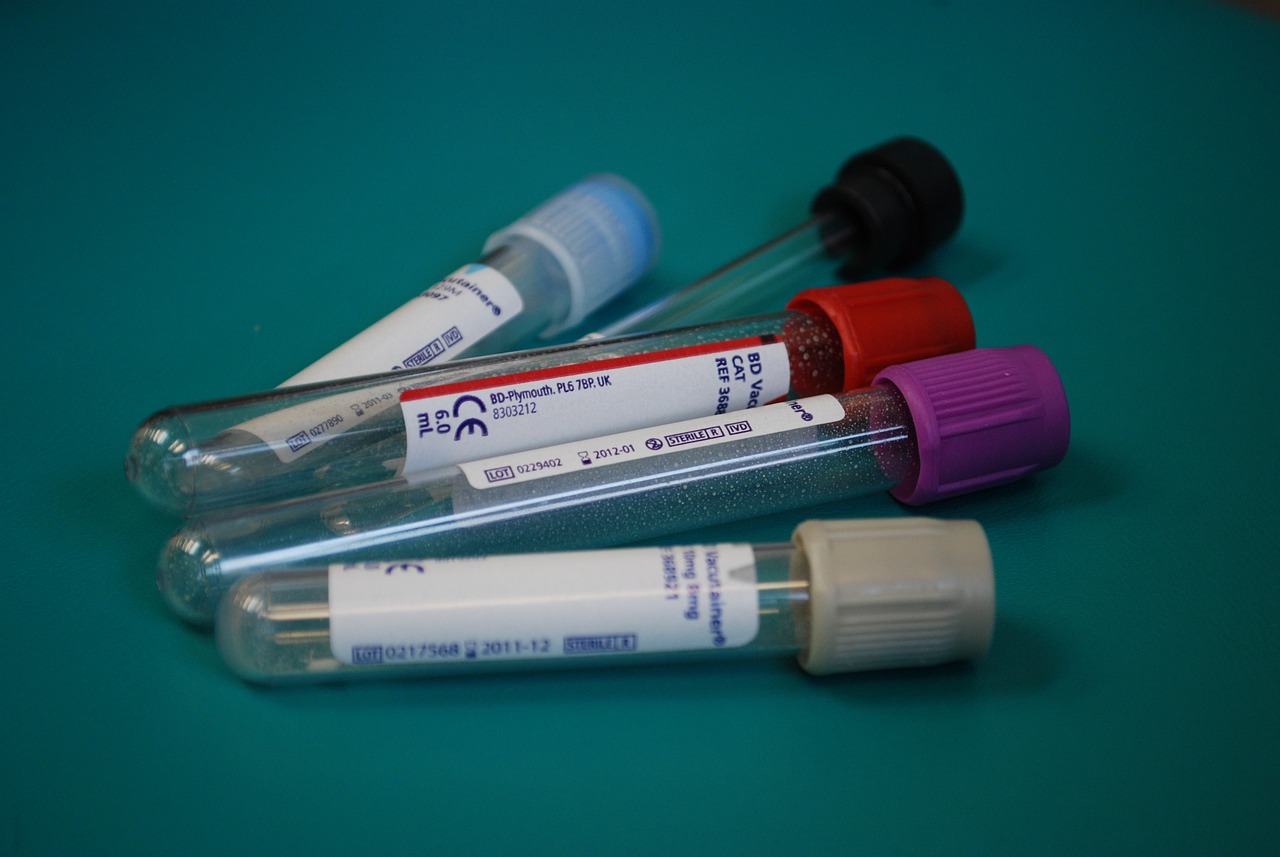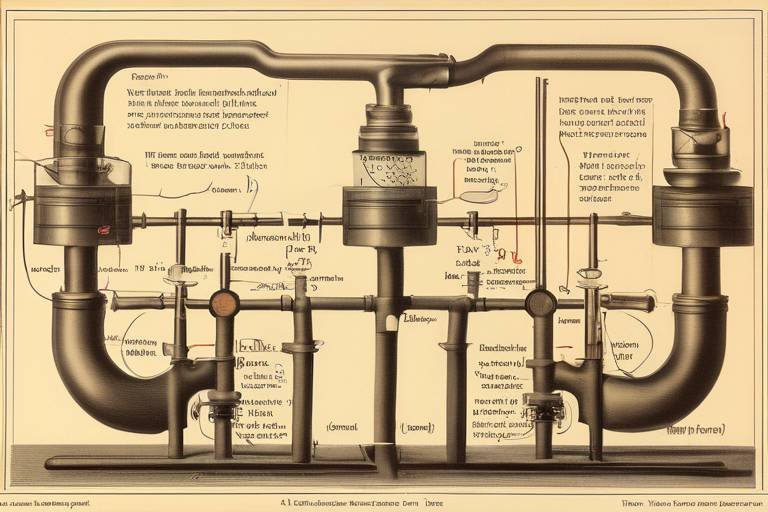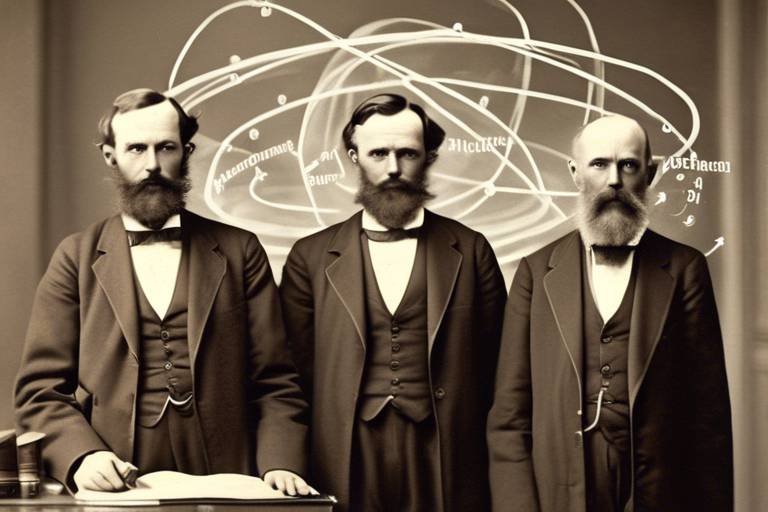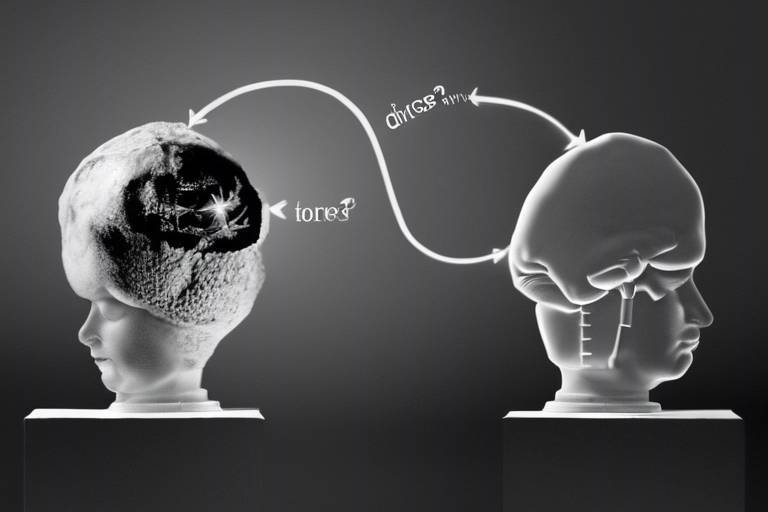Understanding Reproduction with the Philosophy of Biogenetics
Welcome to the fascinating world where reproduction and biogenetics intertwine! This is not just about creating life; it's about understanding the intricate dance of genes and the profound implications they have on how we reproduce. Think of biogenetics as the blueprint of life itself—every twist and turn in our DNA can influence not just who we are, but how we bring new life into the world. In this exploration, we’ll delve into the fundamental principles of biogenetics, revealing how they shape reproductive processes and the ethical considerations that come along with modern scientific advancements.
To kick things off, let’s break down what biogenetics really is. At its core, biogenetics is the study of how genetic information is transmitted from one generation to the next. It involves understanding key concepts such as DNA, genes, chromosomes, and genetic variation. Each of these elements plays a critical role in reproduction. For instance, did you know that the combination of genes from both parents can create a unique genetic blueprint for their offspring? This is where the magic happens! It’s like mixing colors on a palette; the resulting hue can be entirely new and beautiful.
Moreover, the principles of biogenetics help us grasp the complexities of inherited traits. Some traits are straightforward, like eye color, while others, such as predispositions to certain diseases, are influenced by multiple genes. This intricate web of genetic information not only determines physical characteristics but also impacts overall health and susceptibility to various conditions. Understanding these basics equips us to appreciate the advancements in reproductive technologies that leverage this knowledge.
Now, let’s dive into the realm of reproductive technologies. These innovations are revolutionizing how we approach reproduction. Techniques like In Vitro Fertilization (IVF), genetic screening, and preimplantation genetic diagnosis are just a few examples. IVF allows for the fertilization of an egg outside the body, providing couples struggling with infertility a chance to conceive. But it doesn’t stop there! Genetic screening can identify potential genetic disorders before implantation, giving parents the ability to make informed choices about their future child’s health.
However, with great power comes great responsibility. As we harness the capabilities of these technologies, we must also consider the ethical implications. Are we playing God by selecting traits or eliminating genetic disorders? This question leads us into the murky waters of ethical considerations.
The ethical dilemmas surrounding reproductive technologies can be daunting. With the rise of designer babies, where parents might choose specific traits for their children, we find ourselves at a crossroads. While the potential to eliminate genetic diseases is promising, it raises questions about genetic manipulation and the moral implications of altering human genetics. What does it mean for society if we start to select traits based on personal preferences? This could lead to a new form of inequality, where only those who can afford such technologies have access to "ideal" genetics.
As we navigate these technologies, we must also consider their impact on societal norms and family structures. Reproductive technologies have changed the traditional narrative of family planning, allowing single parents, same-sex couples, and others to create families in ways that were once unimaginable. This shift can redefine what it means to be a family in the modern world. The implications for future generations are vast, as these technologies not only affect individual families but also shape the fabric of society itself.
To ensure that the advancements in reproductive technologies are used ethically, robust regulatory frameworks are essential. Existing laws and regulations vary widely across countries, reflecting differing cultural attitudes towards biogenetics and reproduction. There is a pressing need for ethical oversight and public policy that balances innovation with moral responsibility. As we move forward, it’s crucial that these frameworks evolve alongside scientific advancements to protect individuals and society as a whole.
Looking ahead, the future of reproductive biogenetics is both exciting and uncertain. Potential advancements could lead to breakthroughs in understanding genetic diversity and improving reproductive health. Imagine a world where genetic disorders are a thing of the past, where every child is born with the best possible genetic makeup. However, with such power comes the responsibility to tread carefully, ensuring that we do not compromise the essence of what it means to be human.
In this landscape, the role of genetic counseling becomes increasingly important. Genetic counselors help individuals and families navigate the complexities of genetic information, providing guidance on reproductive choices based on their genetic health. This personalized approach empowers families to make informed decisions, ensuring that they are equipped with the knowledge needed to understand their genetic risks.
Genetic testing plays a pivotal role in this process. It aids in identifying hereditary conditions, giving individuals insight into potential health issues that could affect their offspring. By understanding these risks, families can make proactive decisions about their reproductive options, whether that means pursuing certain technologies or considering alternative family planning methods.
Ultimately, the insights gained from biogenetic research significantly influence family planning decisions. Armed with knowledge about genetic health, individuals are empowered to take control of their reproductive futures. The ability to make informed choices not only enhances the likelihood of healthy pregnancies but also fosters a deeper understanding of the genetic legacy we pass on to future generations.
- What is biogenetics? Biogenetics is the study of how genetic information is inherited and expressed in living organisms.
- How do reproductive technologies work? Technologies like IVF involve fertilizing an egg outside the body and can include genetic screening to identify potential disorders.
- What are the ethical concerns surrounding designer babies? The ability to select traits raises questions about genetic manipulation and potential societal inequalities.
- Why is genetic counseling important? It helps individuals and families understand their genetic risks and make informed reproductive choices.

The Basics of Biogenetics
Biogenetics is a fascinating field that combines biology and genetics to explore the intricate mechanisms of life. At its core, biogenetics delves into how genes influence the development, function, and reproduction of living organisms. Understanding biogenetics is crucial, especially when considering the implications it has on reproduction and the technologies that stem from it. One of the key concepts in biogenetics is the gene, which serves as the basic unit of heredity. Genes are composed of DNA, which carries the instructions for building proteins that dictate the physical and functional traits of an organism.
Another important term in this realm is genome, which refers to the complete set of genes or genetic material present in a cell or organism. The human genome, for instance, consists of approximately 20,000 to 25,000 genes that encode the information necessary for human development and functioning. With advancements in technology, we are now able to sequence genomes with remarkable precision, enabling us to gain insights into genetic predispositions to diseases and various traits.
The concept of genetic variation also plays a pivotal role in biogenetics. Genetic variation refers to the differences in DNA sequences among individuals, which can result from mutations, gene flow, and sexual reproduction. This variation is essential for evolution and adaptation, as it provides the raw material for natural selection to act upon. In the context of reproduction, understanding genetic variation is vital for assessing the potential risks of hereditary diseases and conditions that may affect offspring.
In recent years, the field of biogenetics has expanded to include various technologies that enhance our understanding of genetics and its application in reproductive health. These technologies, such as genetic engineering, allow scientists to modify genes to achieve desired traits. For instance, the ability to edit genes using tools like CRISPR has opened up new possibilities for preventing genetic disorders before they manifest. However, this also raises critical ethical questions about the extent to which we should manipulate the genetic code of living beings.
To sum it up, biogenetics is a complex yet captivating discipline that intertwines the principles of genetics with the biological processes of reproduction. As we continue to unravel the mysteries of our genetic makeup, the implications for reproductive technologies and health become increasingly significant. The journey into biogenetics is not just about understanding the science; it's about navigating the ethical landscapes and societal impacts that come with it.
Frequently Asked Questions
- What is biogenetics? Biogenetics is the study of how genetic principles influence biological processes, especially reproduction.
- Why is genetic variation important? Genetic variation is crucial for evolution, adaptation, and understanding hereditary diseases.
- What technologies are used in biogenetics? Technologies like CRISPR and genetic screening are used to enhance our understanding and manipulation of genetics.

Reproductive Technologies
In the realm of modern science, have transformed the way we approach conception, pregnancy, and even genetic health. These technologies are not just about helping couples who face infertility; they are also about enhancing our understanding of genetics and the potential to prevent hereditary diseases. Imagine a world where the complexities of human reproduction can be navigated with the precision of a surgeon's scalpel. This is the promise that reproductive technologies hold.
One of the most well-known reproductive technologies is In Vitro Fertilization (IVF). IVF involves the fertilization of an egg outside the body, in a controlled laboratory environment. Once fertilized, the embryo is monitored for several days before being implanted into the uterus. This process can be a game-changer for couples who struggle with infertility due to various factors, such as blocked fallopian tubes, low sperm count, or unexplained infertility. However, IVF is just the tip of the iceberg when it comes to the array of reproductive technologies available today.
Another significant advancement is genetic screening, which allows healthcare providers to assess embryos for genetic disorders before implantation. This process, known as Preimplantation Genetic Testing (PGT), can identify conditions such as cystic fibrosis or Down syndrome, enabling prospective parents to make informed decisions about their reproductive options. The ability to screen for genetic anomalies raises profound questions about the ethics of choice and the implications of 'playing God' in the reproductive process.
In addition to IVF and genetic screening, we also have technologies like Intracytoplasmic Sperm Injection (ICSI), which is particularly useful in cases of male infertility. ICSI involves injecting a single sperm directly into an egg, bypassing many of the barriers that can prevent natural fertilization. This method has opened doors for countless couples who may have otherwise faced insurmountable challenges in their journey to parenthood.
As we delve deeper into the world of reproductive technologies, it’s essential to consider their implications. For instance, while these technologies can significantly enhance reproductive success, they also introduce a myriad of ethical considerations. Are we ready to grapple with the idea of designer babies—children whose genetic traits are selected by their parents? This leads us to ponder the moral implications of such choices, and whether we should intervene in the natural process of reproduction at all.
Moreover, the societal impacts of these technologies cannot be overlooked. As more people turn to assisted reproductive technologies, family structures are evolving. Traditional norms are being challenged, as single parents, same-sex couples, and older individuals are now able to conceive and raise children. This shift is reshaping our understanding of family and parenthood, leading to broader discussions about acceptance and diversity in our society.
In conclusion, reproductive technologies are not just scientific marvels; they are also catalysts for change in our societal fabric. They empower individuals and couples with options that were once unimaginable. As we continue to explore these advancements, it’s crucial to maintain a balanced perspective, weighing the benefits against the ethical dilemmas they present.
- What is IVF? IVF, or In Vitro Fertilization, is a process where an egg is fertilized by sperm outside the body, and then the embryo is implanted into the uterus.
- What are the risks associated with reproductive technologies? Risks can include multiple pregnancies, ovarian hyperstimulation syndrome, and emotional stress from the procedures.
- How does genetic screening work? Genetic screening involves testing embryos for specific genetic disorders before they are implanted into the uterus.
- Are there ethical concerns with reproductive technologies? Yes, concerns include the potential for designer babies, the moral implications of genetic manipulation, and issues around accessibility and inequality.

Ethical Considerations
As we dive into the fascinating world of biogenetics and reproductive technologies, we can't ignore the ethical dilemmas that come hand in hand with these advancements. Imagine standing at a crossroads where science and morality collide; it's a place where every decision can have profound implications for individuals and society alike. The potential to manipulate genes raises questions that go beyond mere biology, touching on our very humanity.
One of the most heated debates centers around the concept of designer babies. With the ability to select traits such as intelligence, physical appearance, and even predispositions to certain diseases, the line between natural selection and human intervention blurs. Are we playing God? Or are we simply taking control of our genetic destiny? These questions challenge our ethical frameworks and force us to reconsider what it means to be human.
Moreover, the implications of genetic manipulation extend to issues of equity and access. If only a select few can afford these advanced reproductive technologies, we risk creating a society divided by genetic privilege. This creates a potential scenario where the rich can engineer their offspring to be healthier and smarter, while the less fortunate are left behind. It’s a troubling thought that echoes the age-old concerns about class and privilege.
Another significant concern is the potential for unintended consequences. While we may have the capability to edit genes, we are still learning about the complexities of the human genome. The CRISPR-Cas9 technology, for example, has revolutionized genetic editing, but it also poses risks of off-target effects—where unintended parts of the genome are altered. This could lead to unforeseen health issues that might not manifest until generations later, raising questions about our responsibility to future generations.
To further understand the ethical landscape, consider the following key points:
- Informed Consent: Are individuals fully aware of the implications of genetic testing and manipulation?
- Long-term Effects: What are the long-term consequences of gene editing on individuals and society?
- Regulation: How do we establish regulatory frameworks that ensure ethical practices in biogenetics?
As we navigate these complex issues, it's crucial to foster a dialogue that includes not just scientists and ethicists, but also the public. Engaging diverse perspectives can help us address the myriad ethical considerations that arise in the realm of reproductive biogenetics. After all, the future of human reproduction isn't just a scientific endeavor—it's a collective responsibility.
In conclusion, the ethical considerations surrounding biogenetics and reproductive technologies are multifaceted and warrant careful examination. As we stand on the brink of a new era in human reproduction, we must tread thoughtfully, ensuring that our pursuit of knowledge does not come at the expense of our ethical obligations.
1. What are designer babies?
Designer babies refer to children whose genetic characteristics have been artificially selected or altered through genetic engineering techniques.
2. What ethical concerns are associated with genetic manipulation?
Concerns include the potential for inequality in access to technology, unintended genetic consequences, and the moral implications of altering human DNA.
3. How does genetic testing impact reproductive choices?
Genetic testing provides valuable information about hereditary conditions, helping individuals and families make informed decisions regarding their reproductive health.

Societal Impacts
As we delve into the fascinating world of reproductive technologies and biogenetics, it’s essential to consider their profound effects on society. The integration of these technologies into our daily lives is not just a scientific advancement; it’s a revolution that reshapes our understanding of family, identity, and even morality. Imagine a world where the traditional family structure is redefined by genetic choices and technological interventions. What does that mean for our societal norms?
One major impact is the shifting perception of parenthood. With the rise of techniques like in vitro fertilization (IVF) and genetic screening, the journey to becoming a parent is no longer a straightforward biological process. It opens up avenues for individuals and couples who may have previously faced barriers to reproduction, such as infertility or genetic disorders. This shift can foster inclusivity, allowing a broader spectrum of people to experience parenthood, including same-sex couples and single parents. However, it also raises questions about the definition of family and the roles of biological connections versus chosen bonds.
Moreover, the concept of designer babies has emerged from these advancements, sparking heated debates. With the ability to select certain traits or even eliminate genetic disorders, we stand at a crossroads. Are we enhancing human potential, or are we venturing into ethically murky waters? The societal implications of such choices are vast. They can lead to a new form of inequality, where access to these technologies may be limited to those who can afford them, creating a genetic divide. This potential disparity could foster resentment and social tension, as certain groups may feel entitled to a 'better' genetic future.
Additionally, the normalization of genetic testing and screening can alter how we perceive health and wellness. People might start viewing genetic predispositions as deterministic rather than probabilistic, leading to anxiety and stigma. For instance, if someone learns they carry a gene for a hereditary condition, how does that shape their self-image and their relationships? Society must grapple with these new realities, ensuring that individuals are supported and educated about their genetic information without falling prey to fatalism.
We also see a ripple effect on societal structures. As reproductive technologies become more mainstream, they challenge traditional notions of kinship and inheritance. For example, how do we define lineage in a world where genetic material can come from multiple sources? This evolution in understanding can lead to a richer, more diverse tapestry of family structures, but it also necessitates a re-examination of laws and policies surrounding inheritance, custody, and parental rights.
In conclusion, the societal impacts of biogenetics and reproductive technologies are profound and multifaceted. As we navigate this brave new world, it’s crucial to engage in ongoing discussions about the ethical, social, and emotional implications of these advancements. The choices we make today will undoubtedly shape the fabric of future generations, and it’s our responsibility to ensure that we do so thoughtfully and inclusively.
- What are reproductive technologies? Reproductive technologies refer to medical procedures and techniques that assist individuals in conceiving and having children, such as IVF, artificial insemination, and genetic screening.
- How do biogenetics influence societal norms? Biogenetics challenge traditional views of family, kinship, and health, prompting society to reconsider definitions and roles related to parenthood and genetic inheritance.
- What are the ethical concerns surrounding designer babies? Ethical concerns include the potential for inequality, the moral implications of choosing traits, and the risk of reducing individuals to their genetic profiles.

Regulatory Frameworks
When we dive into the world of reproductive biogenetics, it's essential to understand the that govern this complex field. The advancements in genetic technologies have outpaced the development of laws and guidelines, leading to a landscape where ethical considerations often clash with scientific progress. Regulatory frameworks are designed to ensure that reproductive technologies are used responsibly and ethically, protecting both individuals and society at large.
In many countries, these frameworks include a combination of national laws, international guidelines, and institutional policies. For instance, organizations like the World Health Organization (WHO) and the European Society of Human Reproduction and Embryology (ESHRE) provide guidelines that help shape national policies. However, the implementation and enforcement of these regulations can vary significantly across different regions.
One of the critical aspects of these frameworks is the regulation of in vitro fertilization (IVF) and other assisted reproductive technologies (ART). Regulations often address issues such as:
- Eligibility criteria for individuals seeking these technologies
- Consent processes for genetic testing and manipulation
- Storage and use of genetic material
- Screening protocols for genetic disorders
Moreover, as the conversation about designer babies and genetic manipulation heats up, regulatory bodies are faced with the challenge of establishing guidelines that prevent misuse of these technologies. For example, the potential for creating genetically modified embryos raises profound questions about the ethical implications of such actions. Should we allow parents to choose specific traits for their children? And if so, what are the societal consequences of such choices?
To address these concerns, many countries have established ethics committees that review cases involving advanced reproductive technologies. These committees often consist of a diverse group of experts, including ethicists, geneticists, and legal professionals, who work together to ensure that the use of biogenetic technologies aligns with societal values and ethical principles.
In addition to ethics committees, public engagement plays a crucial role in shaping regulatory frameworks. As society grapples with the implications of reproductive technologies, public opinion can influence policy decisions. This is where transparency becomes key; open discussions about the benefits and risks of biogenetics can help build trust between the scientific community and the public.
Ultimately, the regulatory frameworks surrounding reproductive biogenetics must be dynamic and adaptable. As science evolves, so too must the laws and guidelines that govern it. This ensures that we can harness the benefits of biogenetics while minimizing risks and ethical dilemmas. The challenge lies in finding that delicate balance between innovation and responsibility, a task that requires ongoing dialogue among scientists, policymakers, and the public.
Q: What are the main goals of regulatory frameworks in biogenetics?
A: The primary goals include ensuring ethical use of technologies, protecting individual rights, and preventing misuse of genetic information.
Q: How do different countries regulate reproductive technologies?
A: Regulations vary widely; some countries have strict laws while others have more lenient approaches. It often depends on cultural, ethical, and legal perspectives.
Q: What role do ethics committees play in reproductive biogenetics?
A: Ethics committees review and provide guidance on complex cases involving reproductive technologies, ensuring that decisions align with ethical standards.
Q: Why is public engagement important in shaping these regulations?
A: Public engagement fosters transparency and trust, allowing societal values to influence policy decisions related to biogenetics.

Future of Reproductive Biogenetics
The future of reproductive biogenetics is poised to revolutionize how we understand and approach human reproduction. As technology advances at an unprecedented pace, the possibilities seem almost limitless. Imagine a world where genetic disorders can be corrected before birth, or where parents can select traits that enhance their child's health and abilities. This isn't just science fiction; it's rapidly becoming a reality. With the integration of artificial intelligence (AI) and machine learning in genetic research, we are now able to analyze vast amounts of genetic data to predict outcomes more accurately than ever before.
One of the most exciting prospects on the horizon is the development of gene editing technologies, such as CRISPR-Cas9. This powerful tool allows scientists to precisely alter DNA sequences, paving the way for the potential eradication of hereditary diseases. However, this power comes with a heavy burden of responsibility. As we step into this brave new world, ethical considerations will become increasingly critical. Questions about the implications of "designer babies" and the long-term effects of genetic modifications will need to be addressed with care and foresight.
Furthermore, as reproductive biogenetics continues to evolve, we can expect to see enhanced preimplantation genetic diagnosis (PGD) techniques. These advancements will not only improve the success rates of in vitro fertilization (IVF) but also empower parents to make informed decisions about their offspring's health. With the ability to screen embryos for genetic conditions, couples can choose to implant only those that are free from severe genetic disorders. This could lead to a significant reduction in the prevalence of hereditary diseases in future generations.
As we look ahead, it’s also important to consider the social implications of these advancements. The accessibility of reproductive biogenetic technologies may widen the gap between those who can afford such procedures and those who cannot. This disparity raises important questions about equity and justice in healthcare. Will these technologies be available to all, or will they remain a privilege of the wealthy? Addressing these concerns will be essential as we navigate the future landscape of reproductive biogenetics.
Lastly, the future of reproductive biogenetics will likely involve a greater emphasis on collaboration between disciplines. Geneticists, ethicists, psychologists, and policymakers will need to work together to create frameworks that ensure the responsible use of these technologies. By fostering a multidisciplinary approach, we can ensure that the advancements in reproductive biogenetics serve humanity as a whole, rather than a select few.
- What is reproductive biogenetics?
Reproductive biogenetics is the study of how genetic principles influence reproductive processes and the application of genetic technologies to improve reproductive health. - How will gene editing technologies affect future generations?
Gene editing technologies have the potential to eliminate hereditary diseases, but they also pose ethical dilemmas regarding genetic manipulation and designer babies. - What role does genetic counseling play in reproductive biogenetics?
Genetic counseling helps individuals and families understand their genetic risks and make informed reproductive choices based on genetic information.

Genetic Counseling
Genetic counseling is an essential component of modern reproductive health, serving as a bridge between complex genetic information and the real-life decisions individuals and families face. Imagine standing at a crossroads, where each path represents a different future for you and your loved ones. Genetic counselors are like skilled guides, helping you navigate through the intricate maze of genetic data to make informed choices about reproduction and health.
At its core, genetic counseling involves assessing an individual's or family's risk of inherited conditions. This process often begins with a comprehensive evaluation of medical histories, family backgrounds, and any existing genetic disorders. Counselors use this information to provide tailored advice, empowering individuals with knowledge about their genetic health. For instance, if a couple is considering having children and there is a history of a hereditary condition in one partner's family, a genetic counselor can help them understand the risks involved and the options available.
Furthermore, genetic counseling is not just about identifying risks; it's also about providing emotional support. The journey through genetic information can be overwhelming. Many individuals may feel anxious or uncertain about what the results mean for their future. Counselors play a crucial role in addressing these emotional aspects, offering a safe space to discuss fears, hopes, and expectations. They can also connect families with support groups and resources, creating a network of understanding and encouragement.
In addition to emotional support, genetic counseling often includes discussions about genetic testing. This testing can reveal vital information about potential genetic disorders that could affect offspring. For example, tests such as carrier screening can determine if prospective parents are carriers of specific genetic conditions, like cystic fibrosis or sickle cell anemia. The results can significantly influence family planning decisions, allowing couples to weigh their options carefully.
Here’s a quick look at some key aspects of genetic counseling:
| Aspect | Description |
|---|---|
| Risk Assessment | Evaluating family and medical histories to identify potential genetic risks. |
| Testing Options | Discussing available genetic tests and their implications for reproductive choices. |
| Emotional Support | Providing a safe space for individuals to express their concerns and feelings. |
| Resource Connection | Linking families to additional support services and community resources. |
As we delve deeper into the world of genetic counseling, it becomes clear that this practice is not just about science; it's about people. It’s about understanding that behind every genetic marker lies a story—stories of hope, fear, and the desire for a healthy future. The insights gained through genetic counseling can empower families to make decisions that align with their values and aspirations.
In conclusion, genetic counseling is a vital resource for anyone navigating the complexities of reproduction in the context of genetic health. It transforms daunting genetic data into actionable insights, fostering informed decision-making and emotional resilience. As we continue to advance in biogenetics, the role of genetic counseling will only become more crucial, helping to shape a future where knowledge leads to empowerment.
- What is genetic counseling? Genetic counseling is a process that provides individuals and families with information about genetic conditions, risks, and testing options to help them make informed reproductive decisions.
- Who should consider genetic counseling? Anyone with a family history of genetic disorders, those planning to start a family, or individuals who are pregnant can benefit from genetic counseling.
- What happens during a genetic counseling session? A session typically includes a review of medical and family history, discussions about genetic testing options, and support for emotional concerns.
- Is genetic testing always necessary? Not necessarily. Genetic testing is a personal choice and should be discussed with a genetic counselor to understand its implications.

Role of Genetic Testing
Genetic testing plays a pivotal role in modern reproductive health, acting as a powerful tool that empowers individuals and families to make informed decisions regarding their reproductive choices. Imagine standing at a crossroads, where each path represents a different future for your family. Genetic testing serves as a guiding light, illuminating potential hereditary conditions that could impact your loved ones. By analyzing DNA samples, healthcare providers can identify genetic mutations associated with various disorders, enabling couples to understand their risks before conception.
One of the most significant benefits of genetic testing is its ability to provide clarity in the face of uncertainty. For instance, if a couple has a family history of a particular genetic disorder, testing can reveal whether they carry the genes responsible for that condition. This knowledge is invaluable, as it allows for proactive measures, such as considering options like in vitro fertilization (IVF) with preimplantation genetic diagnosis (PGD), where embryos are screened for specific genetic traits before implantation.
Moreover, genetic testing can also help identify carrier status for conditions such as cystic fibrosis, sickle cell disease, or Tay-Sachs disease. By understanding their carrier status, couples can make informed choices about family planning. For example, if both partners are carriers of a recessive genetic disorder, they can discuss the likelihood of having an affected child and explore reproductive options together. This collaborative approach not only enhances the decision-making process but also fosters a deeper understanding between partners about their shared genetic heritage.
Additionally, genetic testing is not just about identifying risks; it also opens doors to personalized reproductive strategies. With the insights gained from genetic testing, healthcare providers can tailor recommendations based on individual genetic profiles. This means that each couple can have a customized plan that aligns with their unique genetic makeup, preferences, and family goals. The result? A more informed and confident journey toward parenthood.
As we delve deeper into the implications of genetic testing, it's essential to acknowledge that this technology is not without its challenges. Ethical considerations surrounding genetic testing, such as privacy concerns and the potential for discrimination based on genetic information, must be carefully navigated. Society must engage in ongoing conversations about how to balance the benefits of genetic testing with the need for ethical standards and protections. After all, while knowledge is power, it must be wielded responsibly.
In conclusion, the role of genetic testing in reproductive health cannot be overstated. It not only provides critical information about genetic risks but also fosters informed decision-making and personalized reproductive strategies. As technology continues to evolve, the hope is that genetic testing will become even more accessible, allowing more families to benefit from its life-changing insights.
- What is genetic testing? Genetic testing involves analyzing DNA to identify genetic disorders or predispositions to certain health conditions.
- Who should consider genetic testing? Couples with a family history of genetic disorders, individuals planning to start a family, or those with known genetic conditions may benefit from genetic testing.
- How accurate is genetic testing? While genetic testing is highly accurate, results can vary based on the type of test and the specific genetic condition being tested.
- What are the implications of genetic testing results? Results can inform family planning decisions, guide healthcare choices, and provide insights into potential health risks.

Impact on Family Planning
When it comes to family planning, the advancements in biogenetics have revolutionized the way individuals and couples approach their reproductive choices. Imagine having the ability to peer into the future of your family's health, armed with knowledge that can guide your decisions. This is not just a fantasy; it’s a reality thanks to the insights provided by genetic testing and counseling. With the understanding of genetic predispositions, parents can make informed choices that align with their values and aspirations for their children.
One of the most profound impacts of biogenetics on family planning is the ability to identify hereditary conditions before they manifest. For instance, through genetic testing, prospective parents can learn about their risk of passing on certain genetic disorders, such as cystic fibrosis or sickle cell anemia. This information can be pivotal in deciding whether to conceive naturally or explore other options, such as in vitro fertilization (IVF) with preimplantation genetic diagnosis (PGD). By utilizing these technologies, couples can significantly reduce the likelihood of their child inheriting a serious genetic condition, thereby improving the overall quality of life for their future family.
Moreover, the emotional aspect of family planning cannot be overlooked. The knowledge gained through genetic counseling can alleviate anxiety and uncertainty. For many, the fear of the unknown can be paralyzing. However, by understanding their genetic health, individuals can take proactive steps. This empowerment leads to more confident decision-making, whether that means choosing to undergo specific medical interventions or opting for alternative family planning methods, such as adoption or using donor gametes.
Additionally, biogenetics fosters a deeper understanding of one’s own body and health. For example, individuals who are carriers of certain genetic traits can engage in discussions with healthcare providers about their reproductive options, including the timing of pregnancies and the potential need for fertility treatments. This knowledge not only helps in planning but also encourages a more holistic approach to health and wellness. Families can prioritize their health and make lifestyle choices that mitigate risks associated with genetic conditions.
As we delve deeper into the societal implications, it’s essential to recognize that biogenetic advancements are not just personal; they have the potential to reshape societal norms surrounding family structures. The traditional notions of family are evolving as more individuals become aware of their genetic backgrounds and the options available to them. This shift can lead to a more inclusive understanding of what constitutes a family, whether through biological connections or chosen relationships.
In conclusion, the impact of biogenetics on family planning is profound and multifaceted. It empowers individuals and couples with knowledge, alleviates fears, and opens up new possibilities for creating families. As technology continues to evolve, it’s crucial for society to embrace these advancements while also considering the ethical implications and ensuring that access to genetic counseling and testing is equitable. Only then can we truly harness the potential of biogenetics to enhance our reproductive choices and foster healthier generations.
- What is genetic counseling? Genetic counseling is a process that helps individuals understand their genetic health and the implications for family planning.
- How does genetic testing influence family planning? Genetic testing provides information about hereditary conditions, allowing couples to make informed decisions about conception and pregnancy.
- Are there ethical concerns associated with genetic testing? Yes, there are ethical considerations, especially regarding privacy, accessibility, and the potential for genetic discrimination.
- What are the options for couples at risk of passing on genetic disorders? Options may include IVF with preimplantation genetic diagnosis, sperm or egg donation, or adoption.
Frequently Asked Questions
- What is biogenetics?
Biogenetics is a branch of science that combines biology and genetics to study how genes influence living organisms. It plays a crucial role in understanding reproduction, as it helps us uncover the genetic factors that affect reproductive processes and outcomes.
- How do reproductive technologies like IVF work?
In vitro fertilization (IVF) involves retrieving eggs and sperm and combining them in a lab to create embryos. These embryos are then transferred to the uterus, increasing the chances of pregnancy. IVF also allows for genetic screening, helping to identify potential genetic disorders before implantation.
- What are the ethical concerns surrounding genetic manipulation?
Ethical concerns include the potential for creating "designer babies," where parents could choose specific traits for their children. This raises questions about equity, consent, and the moral implications of altering human genetics. Society must navigate these dilemmas carefully to ensure responsible use of biogenetic advancements.
- How do reproductive technologies impact family structures?
Reproductive technologies can transform traditional family structures by enabling single parents, same-sex couples, and individuals with fertility challenges to have children. This evolution prompts society to rethink norms around family and parenting, leading to broader acceptance of diverse family configurations.
- What regulations exist for reproductive technologies?
Regulatory frameworks vary by country but generally aim to ensure the safety and ethical use of reproductive technologies. These regulations address issues like consent, genetic testing, and the use of donor gametes, emphasizing the importance of ethical oversight in this rapidly advancing field.
- What role does genetic counseling play in reproductive health?
Genetic counseling helps individuals and families understand their genetic health and the implications for reproduction. Counselors provide information about hereditary conditions, assist in decision-making, and support families in navigating complex genetic information.
- How does genetic testing influence family planning?
Genetic testing can reveal hereditary conditions that may affect reproductive choices. By understanding genetic risks, individuals can make informed decisions about family planning, such as considering IVF with genetic screening or exploring options like sperm or egg donation.



















